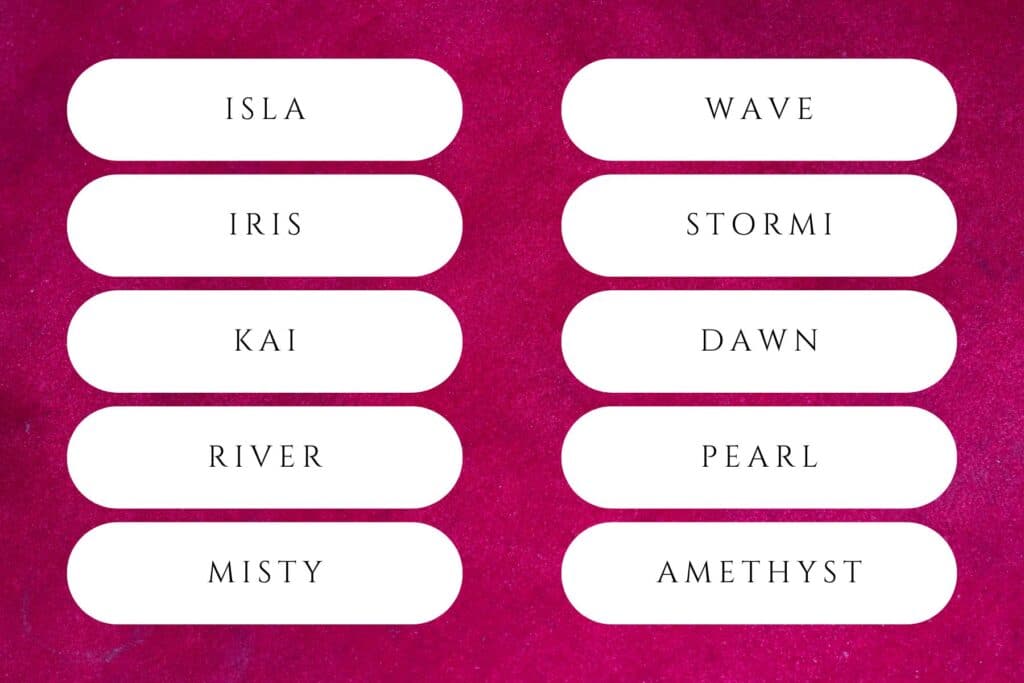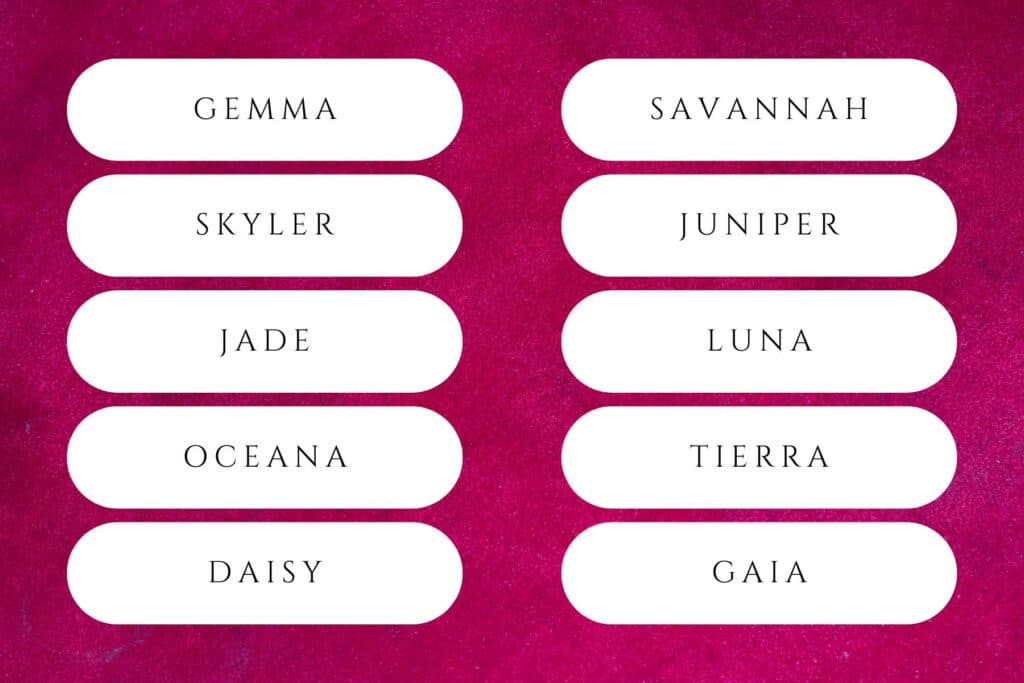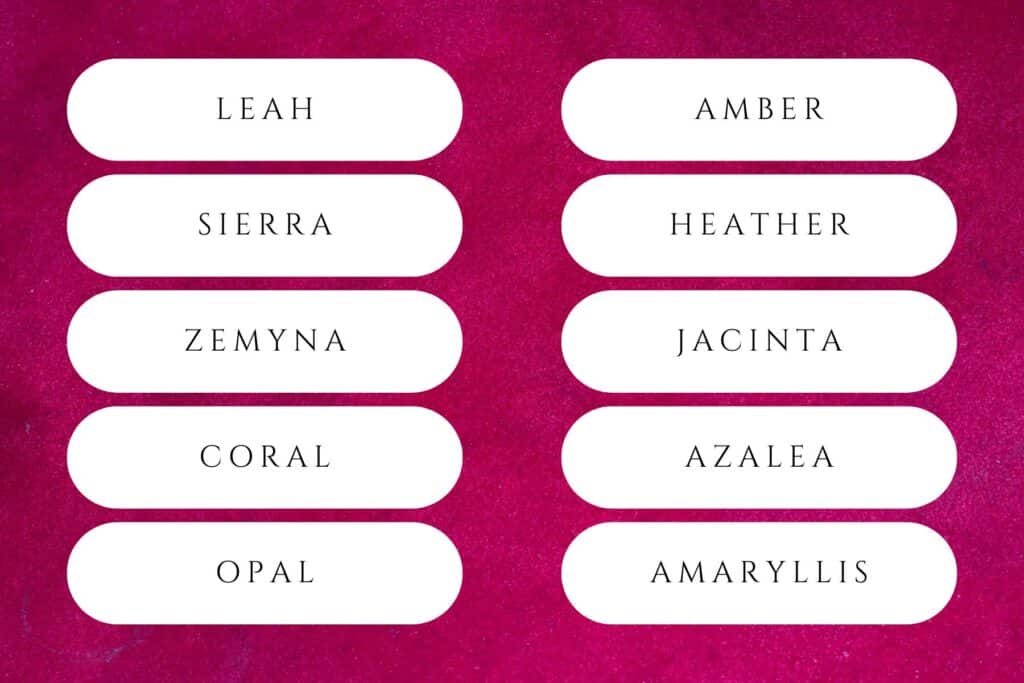“We took some time to settle into our new rhythm before sharing this sweet news.”
Of all the baby-naming trends today, nature names for girls might be one of the most popular.
Just take one look at the Latin name Olivia, which has been the No. 1 most popular girl’s name in the United States every year since 2019, according to the Social Security Administration (SSA).
Olivia, pronounced oh-LIV-ee-uh, derives from the Latin word oliva, meaning “olive tree.”
RELATED: These Rare Baby Girl Names Caught Us Off Guard in 2024
Luna (13th), Violet (15th), Aurora (16th), Hazel (19th) and Lily (24th) also ranked in the SSA’s top-25 in 2024 — and plenty more cracking the top-50, such as Aria, Isla, Ivy, Nova and Willow.
And you know nature baby names is a solid trend when celebrities start joining in.
Country singer Thomas Rhett named his daughter Lillie Carolina, born in 2021, former New York Yankees legend Derek Jeter has two daughters with nature inspired girl names: Bella Raine and River Rose.
“The Bachelor” alum Nick Viall also has a daughter named River Rose, born in 2024.
Influencer Sophie Grace Brownlee named her daughter River, rappers Cardi B and Offset share a daughter named Blossom, and Kylie Jenner and Travis Scott have a daughter named Stormi.
And more celebrity babies are being given nature girl names every month!
Most recently, Dallas Cowboys quarterback Dak Prescott welcomed his second baby with fiancée Sarah Jane Ramos. The baby girl, named Aurora Rayne, was born on May 22.
If you’re in the mood for nature names for girls, then you’ll love the names we found for you below!

Olivia
Origin: Latin; English
Meaning: Olive tree
Olivia, pronounced oh-LIV-ee-uh, is derived from the Latin word oliva, meaning "olive." The olive tree, with its silver-green leaves, has been a symbol of peace and fertility since ancient times, especially in Greek.
Violet
Origin: Latin
Meaning: Blue-purple color; Purple flower
Violet, pronounced VYE-uh-lit, comes from the English word violet and Latin word viola, referring to the purple-blue color or flower known for their charming, delicate petals that come in purple, blue, yellow, and white.
Hazel
Origin: Old English
Meaning: Hazel tree; Hazel nuts; Light brown color
Hazel, pronounced HAY-zuhl, comes from the Old English word hæsel, referring to the hazel tree — known for producing edible nuts and flexible wood. Hazel can also refer to the earthy, light brown color.
Lily
Origin: English; Latin
Meaning: Lily flower
Lily, pronounced LIL-ee, comes directly from the English word for the flower, ultimately derived from the Latin word lilium. Lilies are primarily known to symbolize love, purity, fertility and rebirth in many cultures.
Willow
Origin: Old English
Meaning: Willow tree
Willow, pronounced WIL-oh, comes from the Old English word welig, referring to the willow tree — a deciduous tree with long, slender branches and narrow leaves that's often found growing near water.
Ivy
Origin: English
Meaning: Ivy plant; Clingy; Climber
Ivy, pronounced EYE-vee, comes directly from the English word for the ivy plant, which derives from the Old English ifig. The evergreen ivy plant is known for its ability to cling and climb various walls and trees.
Lillian
Origin: English; Latin
Meaning: Lily flower
Lillian, pronounced LIL-ee-ihn or LIH-lee-ehn, is believed to be an elaborated form of Lily, which derives from the Latin word lillium, referring to the lily flower. Lilies often symbolize love, purity, fertility and rebirth.
Poppy
Origin: Latin; English
Meaning: Bright red flower; Remembrance
Poppy, pronounced PAH-pee, comes directly from the English word for the bright red flower, derived from the Latin word papaver. It’s a symbol of remembrance for World War I veterans and Americans celebrate National Poppy Day every Friday before Memorial Day.
Blossom
Origin: Old English
Meaning: Flower; Bloom
Blossom, pronounced BLAH-sum, comes directly from the English word blossom (derived from the Old English word blostma), referring to the flower of a flowering plant. It was given to 101 baby girls in 2024.
Camellia
Origin: Latin; Japanese
Meaning: Kamel’s flower
Camellia, pronounced kuh-MEE-lee-uh or kuh-MELL-ee-yuh, is the name of a flower, which was named after Georg Josef Kamel. Kamel is a 17th-century Moravian Jesuit botanist who worked in the Philippines.

Dahlia
Origin: Latin; Swedish
Meaning: Dahl’s flower
Dahlia, pronounced DAYL-yuh or DAH-lee-uh, takes its name from the dahlia flower, which was named in honor of 18th-century Swedish botanist Anders Dahl. Dahlia’s have eight sets of chromosomes, whereas humans only have two.
Magnolia
Origin: Latin; French
Meaning: Magnol’s flower; Ancient flower
Magnolia, pronounced mag-NOH-lee-uh, comes from the flowering tree named after French botanist Pierre Magnol (1638-1715). Some fossils prove that magnolia plants existed nearly 20 million years ago.
Zinnia
Origin: Latin; German
Meaning: Zinn’s flower
Zinnia, pronounced ZIN-ee-uh, is the name of a colorful flower that was named after German botanist Johann Gottfried Zinn (1727-1759). They belong to the same family as asters, daisies and sunflowers.
Rowan
Origin: Gaelic
Meaning: Rowan tree; Little red one
Rowan, pronounced ROH-win, comes from the Gaelic word ruadh, meaning "red," and refers to the rowan tree (mountain ash), known for its bright red berries. It’s considered a protective tree in Celtic mythology.
Sage
Origin: English; French
Meaning: Wise; Judicious; Aromatic herb
Sage, pronounced SAYJ, comes directly from the English word sage of French origin, meaning “wise” and “judicious.” It also refers to the aromatic herb of the mint family, known for its medicinal and culinary uses.
Wrenley
Origin: Old English
Meaning: Wren-like; Bird clearing; Meadow of birds
Wrenley, pronounced WREN-lee, combines the Old English elements wrenna, referring to the small songbird (wren), and leah, meaning “clearing” or “meadow.” Many parents today like to spell it Wrenlee.
Oakley
Origin: English
Meaning: Oak tree meadow; Oak tree clearing
Oakley, pronounced OHK-lee, comes from the Middle English words oke, referring to the oak tree, and legh, meaning “clearing” or “meadow.” It refers to a meadow of oak trees or clearing among the oak trees.
Oaklynn
Origin: English
Meaning: Oak tree clearing; Oak tree by the lake
Oaklynn, pronounced OHK-lin, is a variant of Oaklyn and Oakley, which comes from an Old English surname meaning “oak clearing.” It can also combine Middle English oke (oak tree) and Welsh llyn (lake).
Birdie
Origin: English
Meaning: Small bird; One under par
Birdie, pronounced BUR-dee, is an elaborated form of the English word bird, referring to the small, winged animal. It can also refer to “one under par” in golf or be used as a nickname for Bernice or Bertha.
Brooke
Origin: Old English
Meaning: Brook; Small natural stream
Brooke, pronounced BROOK, comes directly from the English word brook and Old English word broc, referring to a small natural stream. It originated as a surname for someone who lived near a brook.

Isla
Origin: Spanish; Scottish
Meaning: Island
Isla, pronounced EYE-luh or EES-luh depending on language, comes from the Spanish word for "island" and can also be tied to the Scottish name Islay, referring to an island off the west coast of Scotland.
Iris
Origin: Greek; English
Meaning: Rainbow; Flower; Eye color
Iris, pronounced EYE-ris, comes from the Greek word for "rainbow" and was the name of the Greek goddess for rainbows. It can also refer to the iris flower or the English word for the colored part of the eye.
Kai
Origin: Hawaiian; Chinese
Meaning: Sea; Triumph; Victory
Kai, pronounced KYE, comes directly from the Hawaiian word kai, meaning “sea.” It can also be derived from the Chinese word kǎi, meaning “triumph” and “victory.” Some parents prefer the name Kaia for girls.
River
Origin: English; Old French; Latin
Meaning: Natural stream of freshwater
River, pronounced RIV-er, comes directly from the English word, which is derived from the Old French word riviere and Latin word ripa, referring to a riverbank or natural stream of freshwater that flows from a source.
Misty
Origin: English
Meaning: Covered in fog or mist
Misty, pronounced MIS-tee, comes directly from the English word misty, which describes something that’s covered in fog or mist. It was popularized by a jazz song titled “Misty” by Erroll Garner, released in 1954.
Wave
Origin: English
Meaning: Move back and forth; Disturbance
Wave, pronounced WAYV, comes directly from the English word wave (derived from the Old English word wafian), either meaning “to move back and forth or up and down” or referring to the water phenomena.
Stormi
Origin: English
Meaning: Disturbance; Tempest
Stormi, pronounced STOHR-mee, comes directly from the English word storm (via Proto-Germanic sturmaz), referring to a disturbed state in the atmosphere. Kylie Jenner named her daughter Stormi.
Dawn
Origin: English
Meaning: Morning; Becoming day
Dawn, pronounced DAWN, comes directly from the English word dawn, meaning “morning,” which was ultimately derived from the Old English word dagian, meaning “to become day” or “light in the morning.”
Pearl
Origin: English; French; Latin
Meaning: Natural gemstone
Pearl, pronounced PURL, comes direclty from the English word pearl (derived from Old French perle and Latin perla), referring to the natural gemstone formed within the soft tissue (mantle) of certain mollusks.
Amethyst
Origin: Greek
Meaning: Purple gemstone; Not intoxicating; February birthstone
Amethyst, pronounced AM-uh-thist, is derived from the Greek negative prefix a combined with the Greek word methystos, meaning “intoxicated.” Ancient Greeks believed the purple gemstone was a remedy for drunkenness.

Gemma
Origin: Latin; Italian
Meaning: Gem; Precious stone
Gemma, pronounced JEH-muh, comes from the Latin and Italian word gemma, meaning “gem” or “precious stone.” This name was extremely popular in the 1980s and is now making a comeback.
Skyler
Origin: English
Meaning: Of the sky
Skyler, pronounced SKYE-ler, is most likely a combination of the English word sky, referring to the upper atmosphere, and a common suffix found on the end of other popular names like Tyler and Kyler.
Jade
Origin: Spanish
Meaning: Green gemstone; Stone of the flank
Jade, pronounced JAYD, refers to the green precious gemstone. Its name comes from the Spanish term piedra de la ijada (stone of the side), as the gem was believed to cure ailments in the area of the kidneys.
Oceana
Origin: English; Latin; Greek
Meaning: Large body of water
Oceana, pronounced oh-SHEE-an-uh, is an elaboration of the English word ocean, which comes from the Latin word oceanus and Greek word ōkeanos, referring to the vast body of water on the surface of the globe.
Daisy
Origin: Old English
Meaning: Day eye
Daisy, pronounced DAY-zee, comes from the Old English phrase dægeseage meaning "day's eye," referring to how the flower opens at dawn. The flower is known for its white petals and sunny center.
Savannah
Origin: English; Spanish; Taino
Meaning: Treeless plain; City in Georgia
Savannah, pronounced suh-VAN-uh, is derived from the Spanish word sabana, which came from the Taino word zabana, referring to a “treeless plain.” It's also the name of a historic city in Georgia, USA.
Juniper
Origin: Latin
Meaning: Juniper tree; Juniper berries
Juniper, pronounced JOO-nih-per, derives from the Latin word iuniperus, referring to the juniper tree — an evergreen conifer known for its berries used in flavoring gin. Its leaves are either needle-like or scale-like.
Luna
Origin: Roman; Latin
Meaning: Moon
Luna, pronounced LOO-nuh, comes directly from the Latin word luna, meaning “moon.” Luna was the Roman goddess of the moon who was often depicted wearing a crown with a crescent moon.
Tierra
Origin: Spanish; Latin; Greek
Meaning: Earth; Land; Crown
Tierra, pronounced tee-AIR-uh, comes from the Spanish word tierra, which is derived from the Latin word terra, meaning “earth” or “land.” It can also be a variant of Tiara, which means “crown” in Greek.
Gaia
Origin: Greek
Meaning: Earth; Land
Gaia, pronounced GYE-uh or GAY-uh, comes directly from the Greek word gaia, a parallel form of the Greek word ge, meaning “earth” or “land.” In Greek mythology, Gaia was the personification of Earth.

Leah
Origin: Old English; Hebrew; Akkadian
Meaning: Meadow; Open Field; Weary; Cow
Leah, pronounced LEE-uh or LAY-uh, comes directly from the Old English word leah, meaning “meadow” or “open field.” It can also be derived from the Hebrew word laʾa, meaning “weary,” or Akkadian word littu, meaning “cow.”
Sierra
Origin: Spanish
Meaning: Mountain Range; Saw
Sierra, pronounced see-AIR-uh, comes from the Spanish word sierra, meaning “mountain range” or “saw,” referring to their jagged appearance. The Sierra Nevada is a mountain range in the Western U.S.
Zemyna
Origin: Lithuanian
Meaning: Earth; Earth goddess
Zemyna, pronounced zeh-MEE-nuh, comes from Lithuanian mythology, where Žemyna was the goddess of the Earth and fertility. The name itself derives from the Lithuanian word žemė, meaning "Earth."
Coral
Origin: Greek; Latin; English
Meaning: Of the sea; Organic gemstone
Coral, pronounced KOHR-uhl, comes from the English word coral, (derived from Greek korallion and Latin corallium) referring to the marine invertebrates and their characteristic red-orange calcium carbonate skeletons.
Opal
Origin: Sanskrit; English
Meaning: Jewel; Iridescent gemstone; October birthstone
Opal, pronounced OH-puhl, is derived from the Sanskrit word upala, meaning "jewel.” Opal is a hydrated amorphous form of silica known for its unique "play-of-color" or iridescence. It’s also October’s birthstone.
Amber
Origin: English; Arabic
Meaning: Yellow-orange color; Fossilized tree resin
Amber, pronounced AM-burr, comes directly from the English word amber (derived from Arabic anbar and Old French ambre gris), referring to the fossilized tree resin known for its orange-ish, yellow-ish color.
Heather
Origin: English
Meaning: Heather; Flowered heath
Heather, pronounced HEH-ther, comes from the Middle English word hather, referring to the hardy evergreen shrub with purple, pink or white flowers known to cover hillsides in Scotland and England.
Jacinta
Origin: Spanish; Portuguese; Greek
Meaning: Hyacinth flower
Jacinta, pronounced juh-SIN-tuh or hah-SEEN-tah (Spanish), is the Spanish and Portuguese feminine form of Hyacinthus, a Greek name derived from the hyacinth flower. In Greek mythology, Hyakinthos was accidentally killed by the god Apollo.
Azalea
Origin: Greek; English
Meaning: Azalea flower; Dry flower
Azalea, pronounced uh-ZAY-lee-uh, derives from the Greek word azaleos, meaning "dry" or "parched," referring to the woody nature of the plant. It’s known for its vibrant, funnel-shaped flowers, and is often deciduous.
Amaryllis
Origin: Greek; English
Meaning: Sparkle; Red flower
Amaryllis, pronounced am-uh-RIL-iss, comes from the Greek word amarysso, meaning “to sparkle.” In Greek mythology, Amaryllis demonstrated her love by piercing her heart with a golden arrow. The striking red flower was believed to have bloomed from her blood.

Marisol
Origin: Spanish
Meaning: Sea and sun
Marisol, pronounced mahr-ee-SOL, comes directly from the Spanish phrase mar y sol, meaning “sea and sun.” It’s sometimes used as a combination of the names Maria and Sol or a short form of María Soledad.
Elowen
Origin: Cornish
Meaning: Elm tree
Elowyn, pronounced EL-oh-win, is a variant of Elowen, which translates to “elm tree” in Cornish. The elm tree is significant in Celtic mythology, symbolizing strength, beauty and a passage to the Underworld.
Ashley
Origin: Old English
Meaning: Ash tree clearing
Ashley, pronounced ASH-lee, is a combination of the Old English words æsc, meaning “ash tree,” and leah, meaning “meadow” or “clearing.” It was originally a boy’s name but is now more common with girls.
Laurel
Origin: Latin
Meaning: Laurel tree; Bay laurel; Victory wreath
Laurel, pronounced LOR-el, derives from the Latin word laurus, referring to the laurel tree or bay laurel. In ancient Greece and Rome, laurel wreaths were often used as crowns to symbolize victory and honor.
Alani
Origin: Hawaiian
Meaning: Orange tree; Heaven; Sky
Alani, pronounced uh-LAH-nee or AY-lah-nee, comes from the Hawaiian word alani, meaning “orange tree,” but it can also derive from the Hawaiian word lani, meaning “heaven” or “sky.” Other variants include Ailany, Aylani and Ailani.
Tamara
Origin: Hebrew
Meaning: Date palm tree
Tamara, pronounced tuh-MAHR-uh, derives from the Hebrew word tamar, meaning "date palm tree." In biblical tradition, the date palm symbolizes fertility and grace. The tree is cultivated for its edible fruit called dates.
Mavis
Origin: English; Old French
Meaning: Song thrush
Mavis, pronounced MAY-vis, comes directly from the English word mavis (derived from the Old French word mauvis), which refers to the small song thrush bird known for its beautiful singing ability.
Hadley
Origin: Old English
Meaning: Heather clearing; Heather meadow
Hadley, pronounced HAD-lee, is composed of the Old English elements hæddre, meaning “heather,” and leah, meaning “meadow” or “clearing.” The first element can also come from names that start with Ad, such as “Adam’s meadow” or “Ada’s meadow.”
Sailor
Origin: English; Old French
Meaning: Of the sea; Boat person
Sailor, pronounced SAY-ler, comes directly from the English word sailor (derived from the Old French word sailleor), referring to someone who sails or a member of a commercial or naval ship or boat.
Paloma
Origin: Spanish
Meaning: Dove; Pigeon; Peace; Love
Paloma, pronounced puh-LOH-muh, comes directly from the Spanish word paloma, meaning “dove” or “pigeon.” Doves are widely recognized as symbols of peace, love, purity, and new beginnings.
Cypress
Origin: Greek; Late Latin
Meaning: Cypress tree
Cypress, pronounced SYE-priss, derives from the Late Latin word cypressus and Greek word kyparissos, referring to the evergreen tree (scientific name Cupressus) that can reach up to 30 metres in height.
Rose
Origin: Latin; English
Meaning: Rose flower
Rose, pronounced ROHZ, derives from the Latin word rosa, referring to the rose flower known for its beauty and fragrance. Roses are universally recognized symbols of love, romance and passion.
Meadow
Origin: Old English
Meaning: Grassy field; Field of hay
Meadow, pronounced MED-oh, comes directly from the Old English word mædwe, referring to a grassy field, particularly one used for hay. The name evokes pastoral landscapes, wildflowers, and open spaces.
Clover
Origin: Old English
Meaning: Meadow flower; Luck; Good fortunr
Clover, pronounced KLOH-ver, is derived from the Old English word clafre, referring to the meadow flower. The four-leaf clover is widely recognized as a symbol of luck, good fortune and positivity.
Marigold
Origin: English; Hebrew
Meaning: Mary’s golden flower
Marigold, pronounced MAIR-ih-gold, comes from the English flower name, which combines the name Mary (referring to the Virgin Mary) with the word gold. The bright yellow-orange flower is regarded as the “flower of the dead” in pre-Hispanic Mexico.
Fern
Origin: Old English
Meaning: Vascular plant
Fern, pronounced FURN, comes directly from the English word for the feathery-leaved plant, ultimately derived from the Old English word fearn. Ferns are one of the oldest groups of plants on Earth.
Why Are Nature Names for Girls So Popular Today?

Nature names for girls are a reminder of the beauty, strength and wonder we’re surrounded by daily.
When parents choose names like Willow, Luna, or Sage for their daughters, they're not just selecting pretty sounds — they're making a statement about the values they hope to instill in their daughter.
They provide the beauty, significance and individuality that many parents are looking for in a name.
Whether drawn to a botanical name like Jasmine, water-inspired name like River, Earth-inspired name like Tierra, celestial name like Luna or gemstone name like Opal — the possibilities are endless!
And if you end up needing some extra inspiration along the way, Mod Moms Club has you covered!
ALSO ON MOD MOMS CLUB: These banned baby names and wild baby-naming laws will leave you speechless!
Not only do we publish new baby name lists (like the one above) weekly, but our readers have access to our extensive baby name generator that can help narrow your baby name list down to your preferences!












